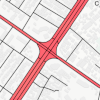A shape-based heuristic for the detection of urban block artifacts in street networks
DOI:
https://doi.org/10.5311/JOSIS.2024.28.31Keywords:
street networks, network simplification, blocks, urban form, urban morphology, urban morphometrics, shape analysis, routing, OpenStreetMapAbstract
Street networks are ubiquitous components of cities, guiding their development and enabling movement from place to place; street networks are also the critical components of many urban analytical methods. However, their graph representation is often designed primarily for transportation purposes. This representation is less suitable for other use cases where transportation networks need to be simplified as a mandatory pre-processing step, e.g., in the case of morphological analysis, visual navigation, or drone flight routing. While the urgent demand for automated pre-processing methods comes from various fields, it is still an unsolved challenge. In this article, we tackle this challenge by proposing a cheap computational heuristic for the identification of ``face artifacts'', i.e., geometries that are enclosed by transportation edges but do not represent urban blocks. The heuristic is based on combining the frequency distributions of shape compactness metrics and area measurements of street network face polygons. We test our method on 131 globally sampled large cities and show that it successfully identifies face artifacts in 89\% of analyzed cities. Our heuristic of detecting artifacts caused by data being collected for another purpose is the first step towards an automated street network simplification workflow. Moreover, the proposed face artifact index uncovers differences in structural rules guiding the development of cities in different world regions.

Downloads
Published
Issue
Section
License
Copyright (c) 2024 Martin Fleischmann, Anastassia Vybornova

This work is licensed under a Creative Commons Attribution 3.0 Unported License.
Articles in JOSIS are licensed under a Creative Commons Attribution 3.0 License.
